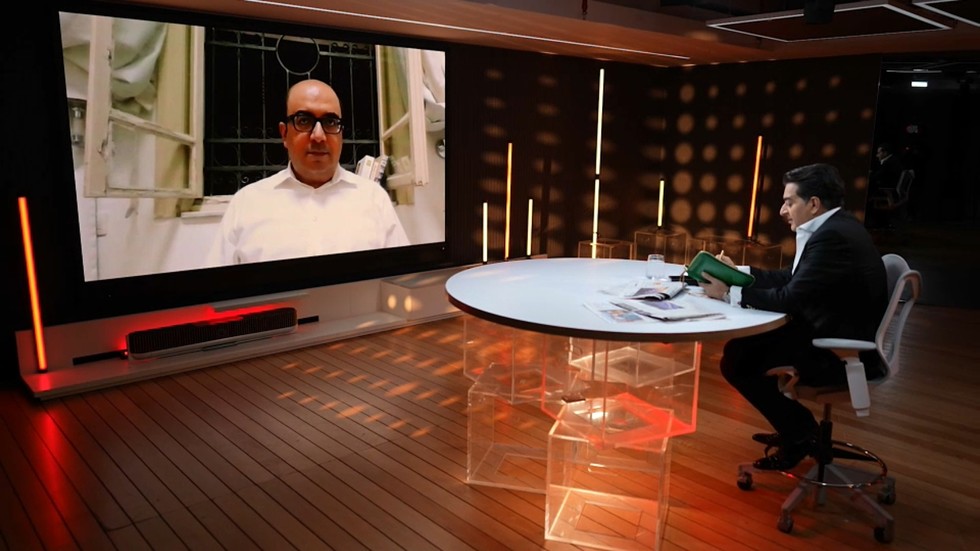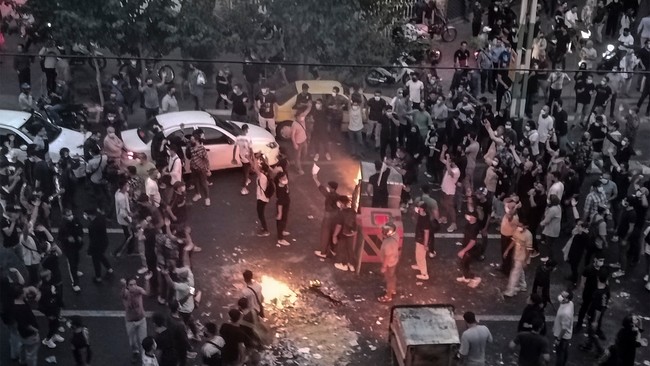https://www.theguardian.com/world/2025/jun/13/israel-says-attack-on-iran-just-the-beginning
Version 8 of 10.
Israel says Iran has fired up to 100 missiles in retaliation for surprise assault as both sides threaten escalating hostilities
Middle East crisis – live updates
Iranian missiles have rained down on Tel Aviv in retaliation for Friday morning’s surprise aerial assault by Israel, as Tehran vowed to open the “gates of hell”, while fresh explosions were heard in the Iranian capital early on Saturday.
Benjamin Netanyahu warned “more is on the way” and said Israel’s attempt to destroy Iran’s nuclear programme was just beginning.
Late on Friday, Iran and Israel reported a new wave of Iranian missile attacks, with explosions heard over Jerusalem. In northern Tehran, residents reported fresh explosions as Iran’s state news agency, IRNA, said Israel had launched further strikes.
The Fars news agency said two projectiles had hit Tehran’s Mehrabad airport, and Iranian media said flames were reported there. Close to key Iranian leadership sites, the airport hosts an air force base with fighter jets and transport aircraft.
An Israeli military spokesperson said earlier that Iran had fired up to 100 missiles in waves earlier in the evening, and that most had been intercepted or missed their intended target, but several appeared to penetrate Israel’s multi-tiered defences.
At about 9pm in Tel Aviv, sirens sounded and phones buzzed with urgent alerts. Half an hour later the city echoed with the mid-air explosions of the Arrow missile defence systems taking out some of the Iranian arsenal, debris smashing into the ground and the blasts of several Iranian warheads that struck their targets.
Smoke from one impact site rose up in columns so thick they obscured the city skyline including nearby skyscrapers, as bright fragments of intercepted missiles arced above. One missile hit a high-rise residential building near the heart of Tel Aviv, shattering windows down most of the facade, and reducing the worst-hit areas to a tangle of exposed, twisted steel bars.
On the ground floor, fire fighters picked their way through the rubble beside the crumpled remains of a car caught in the blast, a report on Israeli TV showed.
Israel’s ambulance service said 34 people were injured on Friday night in the Tel Aviv area, most with minor injuries. Police later said one person had died.
The barrage began after a televised address from Iran’s supreme leader, Ayatollah Ali Khamenei, who pledged: “The armed forces of the Islamic republic will inflict heavy blows upon this malevolent enemy.” He warned the consequences of Israel’s attack “will bring it to ruin”.
Earlier, the new head of the Revolutionary Guards, Mohammad Pakpour – hastily appointed after his predecessor was killed in Israel’s attack – threatened to open “the gates of hell” in retaliation, as the Middle East faced the prospect of a full-scale war of uncertain duration.
Israel’s defence minister, Israel Katz, accused Iran of crossing “red lines” by attacking civilian areas, although some of Israel’s own strikes earlier in the day hit residential parts of Iranian cities.
“We will continue to defend the citizens of Israel and ensure that the Ayatollah regime pays a very heavy price for its heinous actions,” Katz said.
The Israeli pre-dawn strikes on Friday hit more than 100 targets in Iran, including nuclear facilities and missile sites, and killed senior military commanders and scientists in what Tehran said was a “declaration of war”.
Iran’s envoy to the UN security council, Amir Saeid Iravani, said 78 people including senior officials had been killed in the Israeli attacks, and that more than 320 were injured, most of them civilians.
In a video statement on Friday night, Netanyahu said: “In the past 24 hours, we have taken out top military commanders, senior nuclear scientists, the Islamic regime’s most significant enrichment facility and a large portion of its ballistic missile arsenal. More is on the way. The regime does not know what hit them, or what will hit them. It has never been weaker.”
More explosions were reported in Iran on Friday evening and early on Saturday, suggesting a secondary phase of Israeli attacks was already under way, in the early stages of a war that has been brewing for a quarter of a century, ever since Iran’s secret underground uranium enrichment facilities were first exposed, and the US and Israel insisted the country would not be allowed to build a bomb.
The focus of much of the Israeli munitions on Friday was the mostly subterranean uranium enrichment plant at Natanz. The head of the International Atomic Energy Agency, Rafael Grossi, told the UN security council that the above-ground pilot enrichment plant at Iran’s main nuclear facility in Natanz had been destroyed, although he said the level of radioactivity outside the plant remained unchanged.
Grossi said the UN was still gathering information about Israeli attacks on two other facilities, the Fordow fuel enrichment plant and at Isfahan.
Officers of the Israel Defense Forces made clear their war aims were to seize the opportunity offered by Iran’s flattened air defences to wreak lasting, crippling damage on Iran’s nuclear programme.
“That’s the goal, to remove the threat and to make sure they don’t have a nuclear bomb and that there is not an active existential threat on the Israeli people,” an IDF officer said.
Among the uncertainties hanging over the region was how much of Iran’s arsenal of ballistic and cruise missiles were still usable, and whether Tehran would take revenge on the US as well as Israel.
The US role in the attack remained murky. In the run-up to the Israeli 200-plane attack, Donald Trump had publicly urged Israel to give diplomacy more of a chance, before US-Iranian talks that were planned for Sunday. On Friday, the US president insisted he had been well informed of Israel’s plans, and described the Israeli attack as “excellent”.
Asked by the Wall Street Journal what kind of heads-up the US had been given, Trump responded testily: “Heads-up? It wasn’t a heads-up. It was, we know what’s going on.”
Speaking separately to ABC News, he praised the attacks and linked the timing to a 60-day ultimatum he had given Tehran in the spring, to negotiate a deal. “I think it’s been excellent. We gave them a chance and they didn’t take it. They got hit hard, very hard. They got hit about as hard as you’re going to get hit. And there’s more to come. A lot more,” Trump said.
On his own Truth Social online platform, Trump urged Iran to make a deal or face further planned attacks that would be “even more brutal”.
ABC quoted a “source familiar with the intelligence” as saying the US had provided “exquisite” intelligence and would help defend Israel as needed.
Iravani told the UN security council that the US was complicit in the attack, saying “by aiding and enabling these crimes, they share full responsibility for the consequences”. He accused Israel of seeking “to kill diplomacy, to sabotage negotiations and to drag the region into wider conflict.”
The US website Axios quoted two Israeli officials as suggesting the apparent disagreement with Israel had been a ploy, aimed at convincing Iran that no attack was imminent so the generals and scientists on the target list would not move to new locations. “We had a clear US green light,” one of the officials said.
Israel’s first wave of airstrikes took place soon after 8am Iranian time. About 200 Israeli warplanes hit 100 wide-ranging targets.
In a televised address recorded in English for the benefit of foreign audiences, Netanyahu declared: “We struck at the heart of Iran’s nuclear enrichment programme. We struck at the heart of Iran’s nuclear weaponisation programme. We targeted Iran’s main enrichment facility in Natanz. We targeted Iran’s leading nuclear scientists working on the Iranian bomb. We also struck at the heart of Iran’s ballistic missile programme.”
Iranian state media said the head of the Revolutionary Guards (IRGC), Gen Hossein Salami, the army chief of staff, Maj Gen Mohammad Bagheri, and the commander of the Khatam al-Anbia joint forces headquarters, Maj Gen Gholam Ali Rashid, were killed in the strikes, as well as six nuclear scientists, including Fereydoun Abbasi, the head of Iran’s Atomic Energy Organization from 2011 to 2013.
Israel said its assault had killed most of the senior leadership of the IRGC’s air force.
IDF officers said that operation, codename Rising Lion, had involved the infiltration of Mossad commandos before the strikes, as well as drones, to target air defences and Iran’s ballistic missiles.
Later in the day, the Mossad released grainy footage that it said showed agents on Iranian soil. Another video showed what the agency said was an attack on an Iranian defence system, while a third appeared to show an Iranian long-range missile being targeted.
Iranian civilians described a night of terrifying explosions. Golnar, a resident of Saadat Abad, in northern Tehran, said she woke to loud explosions just after 3am.
“I woke up to the first explosion and rushed to the windows to check. Then, minutes later, back to back I heard four explosions. The windows were shaking and people in the building started screaming,” she said. “Everything happened so quickly. We were scrambling for information on whether this was an attack or a natural disaster. This morning there’s debris all over the explosion site and surrounding streets.”
Ahmad Moadi, 62, said: “How much longer are we going to live in fear? As an Iranian, I believe there must be an overwhelming response, a scathing response.”
Additional reporting by Deepa Parent












